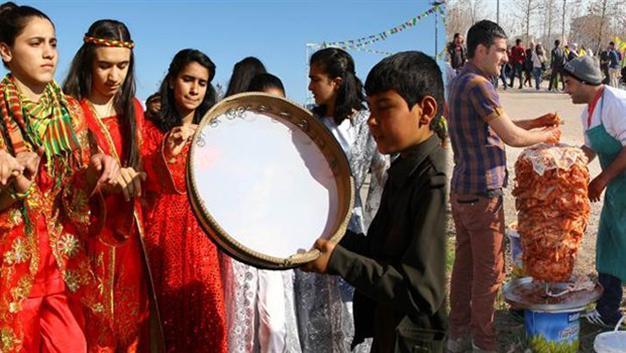A DIY guide to peace at Nevruz in Diyarbakır
Stefan Martens - DİYARBAKIR

The lament at Istanbul's airport was palpable if tongue-in-cheek: "Why can't there be any duty free? Diyarbakır's kind of an international flight," said the person next to me on the plane. Invoking famous funnyman Yılmaz Erdoğan's views on the topic, he added, "It's a country within a country."
And if local people are going to have a say in the matter, Diyarbakır is going to continue to accentuate what makes it different regardless of what the rest of Turkey thinks -- all while acquiescing to remaining under the banner of the Star and Crescent. Nowhere is this difference celebrated more than during Nevruz (Newroz in Kurdish), a marking of the coming of spring in much of the Middle East and Central Asia, but an event that has become infused with Kurdish political identity in Turkey.
Though the holiday is always eagerly anticipated for its color, music and crowds, a large dose of expectation surrounded this year's Nevruz due to its proximity to March 30 local elections.
There was a sense of cautious optimism about the Peace and Democracy Party's (BDP) chances in the elections. "I really hope we can take Şanlıurfa. With Osman Baydemir running, it's possible," said a veterinarian from Mardin that had come for Nevruz in reference to the current metropolitan mayor of Diyarbakır. "Kurds have to unite from now on. If the tribal system finishes, then everything will be OK."
The greatest anticipation, however, was for the content of this year's message from Abdullah Öcalan, the jailed leader of the outlawed Kurdistan Workers' Party (PKK).
If mainstream Turkish TV had attempted to ignore Nevruz from Diyarbakır in the past -- or cover it only insofar as to depict it as a chance for PKK sympathizers to clash with police -- they lined up last year to broadcast live as Öcalan issued a call for a cease-fire and the launching of a peace process.
We'll make peace on our own
Fast-forward 365 days, and the call from Öcalan, Kurdish politicians and hundreds of thousands of ordinary Kurds for the primacy of peace and dialogue remains as strong as ever, even if many feel the Turkish state has failed to hold up its end of the bargain in a slow-moving peace process.
"People are tired [of conflict]. The cease-fire was already unilateral [on the part of the PKK], but the state isn't doing anything," one man told the Hürriyet Daily News.
Ertuğrul Kürkçü, a co-chair of the People's Democratic Party (HDP), the sister party to the main Kurdish party, the Peace and Democracy Party (BDP), also enunciated the people's frustration, albeit coupled with the attitude that Kurds cannot endless wait for Godot.
"If the government can't provide peace, then the people will do it," he said, summarizing Öcalan's message.
In a way, Kurds in Diyarbakır are already doing things on their own, ignoring any possible objections that might come their way. Where once the mayor of Sur Municipality, Abdullah Demirbaş, faced years in prison for deigning to offer multilingual municipal services, the local administration now has signplates in Turkish and Kurdish.
The outskirts of the city may also be blighted by the same housing developments that make many parts of Turkey indistinguishable from each other, but the names of the condominiums ensure that no one can be confused as to the location thanks to titles like Ronahî (a common Kurdish name) or Ehmedê Xanî, a famous poet, whose name also happens to contain one of the most problematic letters in recent Turkish history, "x," which only became permitted following legal changes made in response to years of struggle.
And during Nevruz, most failed to even bat an eyelid at the police; while a busload of officers would warrant a hail of abuse, slogans or worse in many Turkish centers, especially since last year's Gezi protests, their discrete presence at this year's Nevruz was roundly ignored, as if people were giving the message that the long arm of the Turkish state was just something that couldn't be bothered with -- at least on a day like Nevruz.
In the end, the days when the Kurdish struggle was focused on attaining independence are gone, but there is plenty of appetite for creating a country within a country -- a fact some in Ankara would be wise to digest.
















